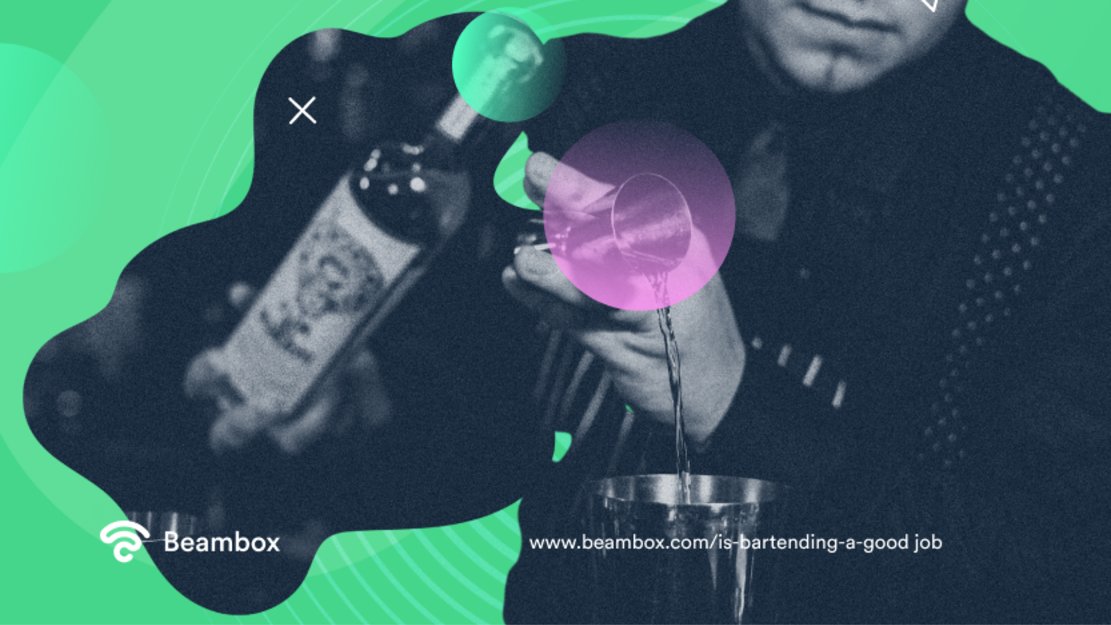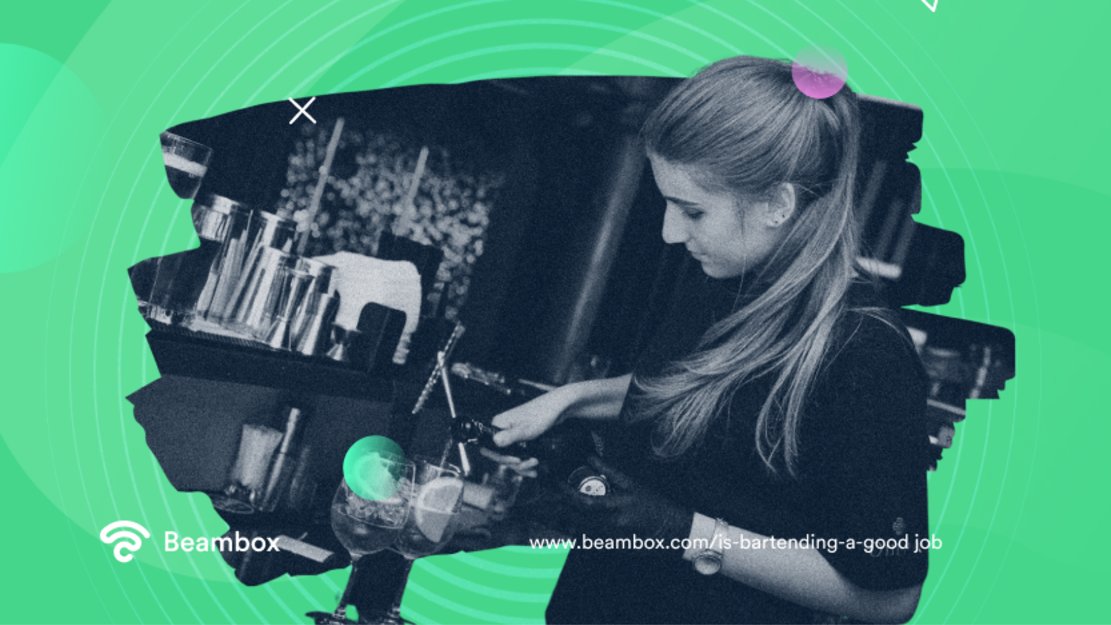Have you ever found yourself intrigued by the atmosphere of a cocktail lounge? Have you ever wondered if bartending is a good job for you? There’s something magic about this profession. The art of mixing drinks, the exciting vibes of the nightlife, and the participation in creating pleasant moments. However, like any profession, bartending comes with its unique set of difficulties alongside its benefits.
This comprehensive guide will bring you into the world of bartending, providing you with a clear overview of the job. You’ll learn about skills, opportunities for growth, and other aspects you should know. Let’s get started!

Is Bartending a Good Job for College Students?
Yes. If you’re asking yourself, “Is bartending a good job for college students?” The answer is is that it can be.
College students often think about this job to make some money on the side. Bartending allows you to create a good life balance. You will be able to study, have hobbies and dedicate time to a job that can be rewarding. Bartending wages and tips are typically above the average. Therefore, it might be a good way to raise money while meeting people and strengthening your social skills.
Working as a bartender offers the possibility of night shifts, making it easier to balance classes during the day. Additionally, the social aspect of bartending might appeal to those looking to expand their network. But it’s not all about pouring drinks and cashing in tips. Bartending requires multitasking, quick thinking, and excellent communication skills. Moreover, if you are not a night owl, it might not be suitable for you.
There are other good alternatives for college students that might suit your lifestyle more:
- Tutoring
- Retail Jobs
- Online Freelancing
- Campus Jobs
- Baby-sitting
- Pet-sitting
- Delivery Driver
Consider all the alternatives and your lifestyle before getting into a specific job. Let’s get going now by talking about growth for bartenders and what doors it can open for you.

Is Bartending a Good Job? Opportunities for Growth in Hospitality
Is bartending a good job to start a career in hospitality?
The answer is yes. Bartending can be a launching pad for a rewarding career in the hospitality industry. With experience, bartenders can advance to managerial roles, overseeing operations and staff in bars, restaurants, or hotels. Moreover, bartending puts you in a context where meeting people and building a network is consequential. Therefore, you might advance faster than others because you know the right people.
For those with a flair for mixology and creativity, becoming a specialized cocktail bartender can elevate their professional standing. This will also lead to better wages and tips.
Seasoned bartenders often branch out into related fields. Some become brand ambassadors for liquor companies, while others might open their restaurants or cocktail bar. All in all, bartending is a great starting point for a career in the hospitality world.

Bartender Career: How To Get Started
If you now think bartending is a good job, you might wonder how to start a bartender career.
You need more than knowing a few cocktails and juggling a bottle. Bartending may seem like an easy gig, but doing it professionally requires study, passion, and grit.
Let’s make clear a common misconception. Knowing your way around a bar is not being a bartender. You need more than knowing how to pour a beer or mix a cocktail. For example, you need a solid understanding of the different types of beverages and how they mix together. That’s why people refer to this art as mixology.
The best way to become a professional bartender is to attend a bartending school. While not always mandatory, many aspiring bartenders attend schools to learn faster. For example, the National Bartending School is a popular one in the US. Here you will learn the basics of mixology, alcohol safety, and customer service. At the end of a course, you will receive a certification that will make you stand out from the competition. A certificate might also get you a better salary.
However, you might create a fantastic bartender career without a formal license. In some states, it’s essential, while in others, on-the-job training suffices.
Let’s now look at the skills required for a bartender, whether you attend a school or not.
Is Bartending a Good Job? Skills Required (More Than Pouring a Drink)
As mentioned, bartending is a good job that can kickstart your career in hospitality while earning you a good salary. However, this job is particular because it requires a blend of both hard and soft skills. You’ll learn these skills during the courses if you get a bartending license. At least the hard skills.
You can hardly be a bartender if you are a lone wolf. The same is true if you are not precise and you’re clumsy by nature. Therefore, to assess whether this career might be for you, let’s have a look at the bartending skills required:
Hard Skills:
-
Mixology: Knowledge of how to mix, garnish, and serve drinks. This will get harder when you need to customize cocktails to suit customers’ preferences.
-
Knowledge of Beverages: Understanding different types of alcohol, including various wines, beers, and spirits. You also need to know how to pair them with food. This is especially important if your venue owner offers bottle service.
-
Cash Handling: This is especially true if you work in a small or medium size business. You’ll need to accurately process cash transactions and give correct change.
-
Physical Stamina: Bartenders are on their feet for long periods and need to be attentive and energetic. You might also need to lift heavy stuff.
Soft Skills:
-
Customer Service: You’ll be in touch with clients. Thus you’ll have an impact on their experience and in growing customer satisfaction. Excelling at interpersonal communication is essential in bartending.
-
Patience: Jobs in hospitality require control of your emotions. Handling difficult customers or working in a fast environment requires you to be calm and composed.
-
Multitasking: Bartenders often have to manage multiple orders and tasks at once.
-
Attention to Detail: A keen eye for detail can set you apart and help you get good tips. Moreover, you might help the venue get more reviews (that will mention you).
As you see, bartending is not for everyone. It requires passion, an eye for detail, and solid knowledge. A bartending mentor can also give you extra teaching from his experience. However, skills don’t tell you the truth about the job itself. Let’s look at the pros and cons you should know about this career.

The Pros That Make Bartending a Good Job
Bartending has been a popular profession for years. That’s why many people think that bartending is a good job. Is it true, though? First, bartending it’s a highly social job that allows you to meet new people every day. Bartenders get to interact with their customers and often make friendships that open new opportunities. In this job, the flow of alcohol facilitates interactions.
Nonetheless, you should not drink. Remember that your job impacts the customer sentiment of the venue you work for.
Secondly, bartending provides flexible work schedules compared to other professions. This means you can work in the evenings or on weekends and still have time for other activities. You’ll be able to study, take care of your family or pursue other interests with daylights.
Thirdly, bartenders earn decent wages plus tips which can significantly boost their income. The amount of money you make depends on the establishment you’re working at and your experience level. However, it’s usually enough to live comfortably. If you are good with people and in the right establishment, tips might become a second wage.
All in all, bartending is the perfect job choice if you enjoy socializing with people and desire good pay plus tips. It’s also an excellent way to build skills in customer service and the hospitality industry. It can also open up more opportunities down the road. But what about the cons?
Is Bartending a Good Job? All the Cons You Need To Know
While bartending is a good job with many upsides, it also comes with its fair share of cons. One major downside is the late hours required for the job. Bartenders often work long shifts that go into the early hours of the morning. This can be the worst possible scenario for many people, especially if you are well above your thirties.
Another negative aspect of bartending is the potential for dealing with difficult customers. Whether it’s someone who has had too much to drink or just a rude patron, bartenders must have thick skin. You need to be able to handle challenging situations with grace and professionalism. Additionally, due to alcohol, there is always the risk of aggressive behavior from customers.
Lastly, in some venues, the quality of the wage will depend on tips from customers. This means that income can vary greatly depending on factors like location and seasonality.
Overall, while bartending may seem like an exciting career, you must weigh all the pros and cons before deciding.
Is Being a Bartender Hard? It Depends on What You Like
Bartending can be challenging, but whether it’s considered “hard” depends on your personality and preferences. Bartenders spend long hours on their feet and deal with a wide variety of customers. The ability to multitask is essential, as you might need to juggle multiple orders while maintaining an organized workspace. Bartenders must also have a strong knowledge of drink recipes and ingredients. This implies that you need to keep educating yourself about the trends in the hospitality industry.
However, the social aspect of the job might make being a bartender hard.
As mentioned, bartenders must possess excellent communication and interpersonal skills. They are in charge of creating an engaging atmosphere in the bar or restaurant they work in. This will require you to be friendly, approachable, and able to connect with customers from all walks of life. You might also need to handle difficult situations calmly and professionally. This might be discouraging and emotionally demanding.
Overall, if you enjoy socializing and thrive in fast stressful environments, bartending may be stimulating rather than difficult. Conversely, if you prefer predictability, early nights, and a more relaxed work environment, being a bartender is hard.
Working as a Bartender: A Day in the Life
After discussing the pros and the cons, it’s worth making an example. This section outline a typical day when working as a bartender. The day typically starts with preparation tasks. You might need to restock the bar with alcohol, ice, garnishes, and other supplies. It will be your job to ensure that the bar area is clean and inviting.
Once the doors open, the bartender is the heart and soul of the bar. You’ll have to juggle multiple tasks. Taking orders, mixing drinks, processing payments, and engaging in friendly banter with patrons. In quieter moments, they might recommend new drinks, share a joke, or simply lend an ear to a customer’s story. These moments are also the ones where you can show off performative tricks with bottles and glasses.
During peak hours, you’ll need to handle multiple tasks and prepare the drinks as fast as you can. This is not the time to juggle or do any performative trick. As the evening proceeds, you’ll have to keep the bar area clean and organized while keep being a friendly person.
When it’s closing time, there’s more cleaning to do. For example, washing glasses, wiping down the bar and taking inventory for the next day. All in all, bartending is a busy, dynamic job where no two days are the same.
Is Bartending a Good Job? Ultimately, It Depends on You.
As we’ve explored in this guide, bartending is a good job that blends hard skills and soft skills. It offers growth opportunities, flexible hours, and a social, dynamic work environment. However, it comes with its challenges, including irregular hours, unpredictable income, and physical demands. Moreover, the enjoyment you derive from the job will depend on the venue and its customers.
Whether bartending is a good job depends on your personality, lifestyle, and career aspirations. If you thrive in social settings, bartending could be a rewarding career choice.
Are you working in a venue that is not using WiFi marketing to get more customers? Then, suggest Beambox.
Beambox’s WiFi marketing platform simplifies data collection and automates marketing campaigns. A venue can also enhance its online presence by growing its rating on the most popular local reviews sites. But there’s more than that, and anyone can find it out by trying Beambox for free for thirty days. Start now!
Get Started With Free WiFi Marketing
Beambox helps businesses like yours grow with data capture, marketing automation and reputation management.
Sign up for 30 days free